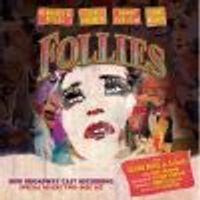Top Ten Greatest Composers of Musical Theater
#75Top Ten Greatest Composers of Musical Theater
Posted: 1/27/11 at 1:13pm
Can you objectively - looking at Sondheim's body of work, and looking at all the other composers there are - OBJECTIVELY say there are ten composers better than him? Ten composers more proficient? Ten composers more technically great?
I am a teacher. Say a music teacher needed to objectively grade all the composers in the music theater canon. Would Sondheim not receive top marks?
I would think he would.
The topic of the thread is "greatest." That term can be understood however you want it to be understood. My list consisted of my favorites. From an objective standpoint, can you argue that there are ten composers better than Sondheim?
#76Top Ten Greatest Composers of Musical Theater
Posted: 1/27/11 at 1:19pm
Jason's finally injecting a little scholarship here.
Q
Broadway Legend Joined: 11/3/05
#77Top Ten Greatest Composers of Musical Theater
Posted: 1/27/11 at 1:21pm
Jason - you do understand, don't you, that even the criteria for what constitutes 'greatness' is subjective? What if the biggest criteria is who has had the most influence on society in general, outside the theatrical community?
#78Top Ten Greatest Composers of Musical Theater
Posted: 1/27/11 at 1:40pm
Q - you're right, but let me flip it back on you for a second. Can you think of a criteria (aside from box office success which isn't something I would judge "composer" greatness by at all) that Sondheim WOULDN'T be in the top ten for?
Since we're talking greatness here, on an objective scale, I think we'd have to talk about an aggregate of criterion: technical ability, influence, appropriateness to material, creativity, variety, etc.
For example, I would argue Gershwin would likely be on a list of greatness like this. Jason Robert Brown wouldn't be. I enjoy both, but one made my list of "favorites" and one didn't.
Of course everyone is going to have their subjective favorites, and that list is incontravertable because it's opinion.
If you read Finishing the Hat, Sondheim talks about what makes for great lyrics from an objective view point, despite the fact that CRAFTING lyrics is an art. Music has to be the same - an objective view by which the form can be judged. Otherwise, any hack could be considered great because someone "likes" them.
I don't honestly know enough technical details about music to truly be a judge (I'm not a music teacher, after all), but there are people on this thread who are. Based on the number of people who included Sondheim, it seems to me reasonable that from that objective point, he should be included on any top ten list that wasn't specifically "favorites."
#79Top Ten Greatest Composers of Musical Theater
Posted: 1/27/11 at 2:08pm
It's awfully difficult for a musician to have a deep discussion/exchange of ideas about music with a non-musician.
It would be like discussing Japanese poetry with someone who neither reads nor speaks Japanese. Or discussing Matisse's use of color with some one color-blind.
Updated On: 1/27/11 at 02:08 PM
After Eight
Broadway Legend Joined: 6/5/09
#80Top Ten Greatest Composers of Musical Theater
Posted: 1/27/11 at 2:19pm
Jasonf:
Since you're so enamored of the notion of objectivity, capital letters or otherwise, perhaps you should let a computer comprise the list. And if the computer put your idol on the top of the list, then you might have a leg to stand on. (I would then believe someone had tampered with the computer.)
I must confess I find your rigidity and arrogance obnoxious. But the combination is, unfortunately, encountered more than a little among your idol's adherents. I'm certainly glad I'm not one of your students.
Why don't you pay attention to the rejoinders to your posts, and comport yourself with a modicum of grace?
#81Top Ten Greatest Composers of Musical Theater
Posted: 1/27/11 at 2:21pm
Newintown, I think I get your point, but I can't agree with your examples here.
You seem to be saying that someone who doesn't create a particular thing (music, in this instance) can't discuss it. I gather you're a musician of some sort, but I would imagine you also discuss books, films, fine dining, wine, fashion--any number of things that you probably don't engage in as a profession.
#82Top Ten Greatest Composers of Musical Theater
Posted: 1/27/11 at 3:05pm
Reginald's exactly right. I never claimed technical knowledge. But you want objectivity - how about this - compile a list of 100, 1,000, or 10,000 people who you respect in terms of their musical theater knowledge. Ask them this question.
How many would have Sondheim on the list?
As for my idol, yes, he would be the top of my list, but I would just as fervently argue for Rodgers or Gershwin under the same criteria.
Honestly, I find it beyond bewildering that anyone could get on a Broadway message board and NOT see that some composers are simply BETTER than others from a non-subjective view.
Similarly, whether you like it or not, you can't argue that F Scott Fitzgerald was a masterful writer. I wasn't a huge fan of The Great Gatsby, but that doesn't make me any less an admirer of his ability as a writer.
What I'm hearing in response to this is "I'm right, you're wrong, so there." I'm not denying, nor have I EVER denied, that people not like Sondheim (or Rodgers or Gershwin). That's an opinion.
I have yet to see someone come on here and argue that my actual point, that these composers ARE the best of the best from an objective standpoint, is false. Calling me arrogant is not an argument.
And you're damn straight you're glad you're not one of my students - if you were and tried to argue with me as you have been, by name calling and avoiding the issue, I would fail you.
After Eight
Broadway Legend Joined: 6/5/09
#83Top Ten Greatest Composers of Musical Theater
Posted: 1/27/11 at 3:56pm
Jasonf:
"I'm right, you're wrong, so there."
Uhhh, Jason, look in the mirror. That's precisely what YOU are doing. Can't you see that?
Personally, I don't care if you put him on the top of the list, or if 999,999 other people do the same. If that's how you feel, what do I care? I just don't like being told by someone like you that that's how I HAVE to feel, and if I don't, it's
F in the course.
You would fail me then? I have no doubt of it. I can't say it bothers me terribly
much, since it won't be affecting my grade point average. :)
#84Top Ten Greatest Composers of Musical Theater
Posted: 1/27/11 at 4:17pmAnd still no legitimate response...
After Eight
Broadway Legend Joined: 6/5/09
#85Top Ten Greatest Composers of Musical Theater
Posted: 1/27/11 at 4:28pm
"And still no legitimite response..."
from you.
Updated On: 1/27/11 at 04:28 PM
#86Top Ten Greatest Composers of Musical Theater
Posted: 1/27/11 at 5:24pm
1. Kern
2. Gershwin
3. Rogers
4. Berlin
5. Arlen
6. Porter
7. Styne
8. Loesser
9. Romberg
10. Friml
After Eight
Broadway Legend Joined: 6/5/09
#87Top Ten Greatest Composers of Musical Theater
Posted: 1/27/11 at 5:35pm
Wow, Tulita, your list is like waving a red flag in front of a bull. I admire your courage!
I'm afraid you too are now going to be given an F.
And thanks for the kind words earlier in this thread.
#88Top Ten Greatest Composers of Musical Theater
Posted: 1/27/11 at 6:03pm
Like Tommasini, you never define "greatness" or "great," so people are free to submit their favorites as their idea of the "greatest." I took "great" to imply some aspiration to quality rather than simply success or likability, so my list is based on weighing my likes against both the reach and the grasp of the composer's body of work.
1. Stephen Sondheim
The "greatest," because, quite simply, his accomplishments far and away surpass all others. Even his failures, it has been said many times, are more interesting than others' successes. And those failures often seem less like failures with time, something that cannot be said of all others.
2. Leonard Bernstein
Had he gone on writing for the musical theater rather than devoting his post-West Side life to conducting, I am quite sure he would have been #1.
3. George Gershwin
And had he too lived on and gone on writing for the musical theater, I am sure he would have surpassed Sondheim and Bernstein. The accomplishment and aspiration of Porgy and Bess alone puts Gershwin at the top, but his scores for his 1920s and 1930s musical-comedies injected a level of musicianship that set a revolutionary bar that inspired other composers to be greater.
4. Richard Rodgers
In terms of his effect on the general population, he ought to be #1, but see Sondheim's "Franklin Shepard, Inc." for why he is not.
5. Jerome Kern
Not just for Show Boat, although that would have been enough. Like Gershwin's early scores, Kern's 1920s Princess Theater musical-comedies contained melodies that surpassed the standards of the day and brought wit and intelligence to show music.
6. Irving Berlin
An immigrant Jew for whom English was a second language...yet he took what George M. Cohan and Stephen Foster had established as "American music" and wrote show after show that continued to re-define what American music sounded like. That he did that without being able to play piano--AND writing the lyrics too--is literally mind-boggling.
7. Cole Porter
Just as Kern brought wit and intelligence to musical comedy, Porter brought sex and sophistication. He tried toward the end of his life to keep up with the artistic aspirations of his colleagues, and with Kiss Me, Kate, he created a crown jewel that will endure.
8. Jerry Herman
How could anyone leave him off the list? His relentless optimism and high spirits are irresistible, and he almost single-handedly kept alive the spirit of "musical comedy" while all his colleagues were moving into "musical theater." He loses points for not aspiring higher...but aren't we kinda glad he never tried? The results would probably have been, to quote Gloria Upson, GHASTLY.
9. Frank Loesser
For sheer "world-building," Loesser earns a place for the gangster world of Guys and Dolls and the corporate world of How to Succeed. And he gets aspiration points for Most Happy Fella. But he also deserves a place for the mentoring and inspiring he did for other other composers.
10. I award this position to (in alphabetical order): Harold Arlen and Marc Blitzstein and Jerry Bock and Cy Coleman and John Kander and Frederick Loewe and Harold Rome and Charles Strouse and Jule Styne and Kurt Weill and Maury Yeston.
Oops--one more!
11. Marc Shaiman
In case he's reading this.
#89Top Ten Greatest Composers of Musical Theater
Posted: 1/27/11 at 6:10pm
LOL. Thanks, Joey, for your astute comments, as always. ![]()
#90Top Ten Greatest Composers of Musical Theater
Posted: 1/27/11 at 6:32pm
Thank you, After Eight! And I don't dislike Sondheim - just SondheimSnobs, Inc.
PJ, what does Sondheim say about Rodgers? Rodgers would be in the very top three or four of my ranking.
#91Top Ten Greatest Composers of Musical Theater
Posted: 1/27/11 at 7:13pm
AfterEight, you fired the first shot here by saying you wouldn't even READ Paul's explanations after he proclaimed Sondheim the top of his list. You have the arrogance to say that because you don't agree with him, the rest of his list and (rather intelligent) comments were invalid because of it. You've continued to attack without once giving an actual explanation for your opinions. Merely stating you're entitled to your opinions (which you are) is not an defense or argument for them.
So I ask, trying to be as fair as I can, why do you NOT consider Sondheim to be one of the greatest composers of musical theater? What criteria does he not meet for you?
#92Top Ten Greatest Composers of Musical Theater
Posted: 1/27/11 at 7:58pmI think the men that did My Fair Lady, Camelot, Brigadoon, and Gigi should be on a few more lists.
#93Top Ten Greatest Composers of Musical Theater
Posted: 1/27/11 at 8:05pmI respectfully disagree. I never got into Loewe. He bores me to tears from a musical standpoint. Lerner's lyrics, on the other hand are heavenly.
#94Top Ten Greatest Composers of Musical Theater
Posted: 1/27/11 at 8:17pm
In going with the "three great shows" rule:
1. Stephen Sondheim (Company, Sunday In The Park With George, Sweeney Todd)
2. Rodgers and Hammerstein (Oklahoma, Carousel, South Pacific)
3. Kander and Ebb (Cabaret, Chicago, Curtains)
4. Bock and Harnick (Fiddler On The Roof, The Apple Tree, Fiorello)
5. Lerner and Loewe (My Fair Lady, Paint Your Wagon, Camelot)
6. Jerry Herman (Hello, Dolly!, La Cage Aux Folles, Mack & Mabel)
7. Lloyd Webber and Rice (Evita, Joseph, Jesus Christ Superstar)
8. Rodgers and Hart (Pal Joey, On Your Toes, The Boys From Syracuse)
9. Kurt Weill (Threepenny Opera, Rise and Fall of the City of Mahogany, Knickerbocker Holiday)
10. Stephen Schwartz (Wicked, Godspell, Pippin)
Feel free to critique!
*EDIT*
In the rush to post, I accidentally placed Fiorello on two lists... Oops!
Updated On: 1/27/11 at 08:17 PM
#95Top Ten Greatest Composers of Musical Theater
Posted: 1/27/11 at 8:22pm
you have Fiorello! listed twice under two different composing teams.
And Curtains? really? they have so many better shows than that one. But if that's your cup of tea, I guess that's ok.
After Eight
Broadway Legend Joined: 6/5/09
#96Top Ten Greatest Composers of Musical Theater
Posted: 1/27/11 at 8:23pm
Jasonf,
Not trying to be recalcitrant, and actually, I admire your fervor and enthusiasm. I admire Pal Joey's as well, but if you look at his assessments, there is no backup of his assertions. He just says that Sondheim's accomplishments far surpass everyone else's. He doesn't tell in what way, to what degree, or anything of the like. Does that bother you? Are you demanding any further explanation from him? If not, why not?
So I can say just like PJ that the work of the composers I placed on my list far
surpasses anything Sondheim ever produced, and leave it at that. What's ok for PJ is ok for me. You already flunked me once, so if you flunk me again, well, I guess I'll just have to bear that indignity a second time.
As for my firing "the first shot," excuse me, but you misread my post to Paul. My
objection was not to Paul's placing Sondheim at the top of the list. It was to his
use of the snooty phrase "I mean, come on." I'm really not interested in the
views of someone who uses such a term, though I'm sure his assessments are intelligent and well thought. He strikes me as a highly intelligent person.
Why does a rose garden smell more beautiful than a sulphur mine? It just does, and one needn't be obliged to offer a chemical analysis to explain why.
#97Top Ten Greatest Composers of Musical Theater
Posted: 1/27/11 at 8:29pm
@Pippin
Sorry for the typo on Fiorello! And Curtains is my cup of tea, though I considered placing Kiss of The Spider Woman on their list instead...
#98Top Ten Greatest Composers of Musical Theater
Posted: 1/27/11 at 9:06pm
The difference is that PJ didn't denigrate any other composers. You did. If it's a matter of taste, like I've said over and over, that's fine. However, your analogy of smell is simply a matter of opinion. I'm asking why you think Sondheim is a "lesser" composer. Not why you like him less, but why you think he's less accomplished than the others on your list.
Personally, I don't like operettas like those of Friml and Romberg. For what they did, I think they're amongst the best, but I personally don't choose to listen to their work because I don't connect with it. That doesn't diminish their accomplishments any to me (and in fact I don't see how one can compare that style of work to modern musical theater composers at all - it's like comparing Beyonce to Beethoven if you ask me) and I can appreciate them for what they did.
You wrote: "As for my firing "the first shot," excuse me, but you misread my post to Paul. My
objection was not to Paul's placing Sondheim at the top of the list. It was to his
use of the snooty phrase "I mean, come on." I'm really not interested in the
views of someone who uses such a term, though I'm sure his assessments are intelligent and well thought. He strikes me as a highly intelligent person."
Aren't you contradicting yourself here? He strikes you as highly intelligent, yet you won't read his other arguments because of one phrase? Based on the consensus here, he was no more out of his mind for thinking Sondheim is a given than one would be going into my classroom, asking the girls who their favorite singer is, and thinking Justin Bieber would take the top votes.
#99Top Ten Greatest Composers of Musical Theater
Posted: 1/27/11 at 9:38pm
OP here. I'm certainly not sorry I created this discussion thread, but I sincerely regret the disagreements I have inadvertantly caused. As for being snooty, there's probably no way to state that my intention was only to be funny or informal, without sounding snooty again! Nor was I directing my comment toward anyone. I was being goofy, and I guess I came off as glib or argumentative. I meant nothing but light-heartedness and jest. But thanks to all for being so involved in the topic! It's quite remarkable. ![]()
Videos







